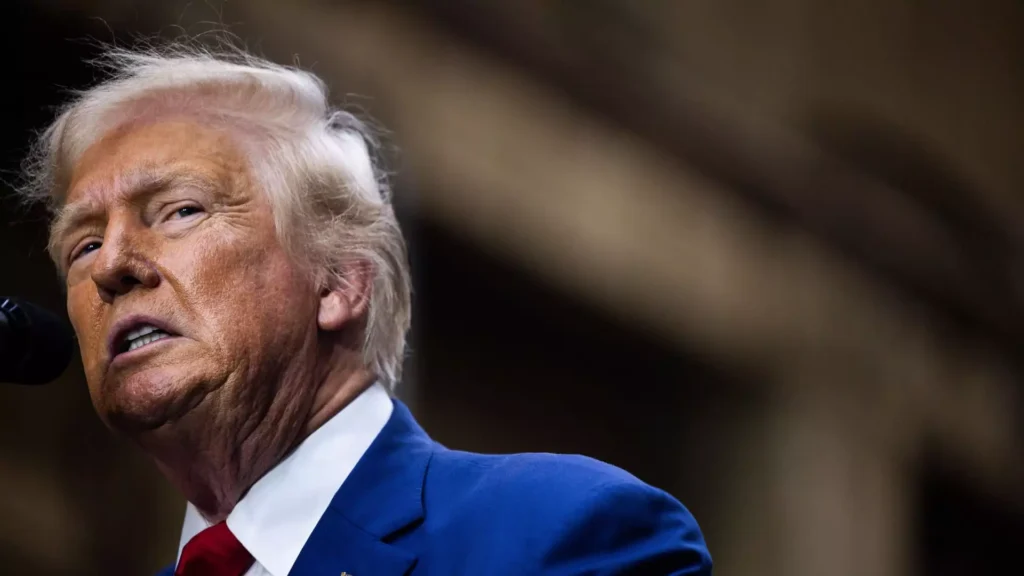KEY POINTS : Jonathan Braun Trump clemency
- A New York federal judge ordered U.S. probation officials to investigate the recent arrest of a convicted drug dealer who was released from prison in early 2021 after his 10-year sentence was commuted by former President Donald Trump.
- The order raises the possibility that the drug dealer, Jonathan Braun, could be sent back to prison for his federal marijuana-related conviction because of his arrest last week in Nassau County, New York, for allegedly assaulting his wife and father-in-law.
- It also raises the prospect that Braun could become an issue in the 2024 presidential election, where Trump is trying to paint Democratic nominee Vice President Kamala Harris, a former prosecutor, as soft on crime.

Republican Presidential nominee, former president Donald J. Trump remarks during a campaign event at Precision Custom Components on August 19, 2024 in York, Pennsylvania.
…………………………………………………………………………………………………………………………………………………………………………………………………………………………………………
Federal Judge Orders Investigation into Jonathan Braun’s Recent Arrest
A federal judge in New York has recently ordered U.S. probation officials to investigate the arrest of Jonathan Braun, a convicted drug dealer who was released from prison early in 2021 due to clemency granted by former President Donald Trump. Braun’s arrest in Nassau County, New York, has ignited a fresh round of legal scrutiny and political debate, underscoring the potential consequences of Trump’s clemency decisions.
The Connection Between Jonathan Braun and Trump Clemency
Jonathan Braun, whose 10-year prison sentence was commuted by Trump, now faces serious legal issues that could jeopardize his freedom. The clemency granted by Trump, which allowed Braun to be released from federal custody ahead of schedule, is now under renewed scrutiny. Braun’s arrest involves allegations of domestic assault against his wife and father-in-law, bringing his legal troubles back into the spotlight.
Assault Allegations and Legal Implications
The arrest of Jonathan Braun has been marked by serious allegations. Braun is accused of assaulting his father-in-law while allegedly trying to protect his daughter. These assault charges, combined with additional accusations related to unpaid bridge tolls and driving luxury vehicles without license plates, complicate Braun’s legal situation further. The nature of these charges raises significant questions about Braun’s behavior and adherence to legal norms following his release.
Judge Kiyo Matsumoto’s sealed order directing probation officials to investigate Braun’s arrest is a critical development. The investigation will assess whether Braun has violated the terms of his supervised release, adding another layer of complexity to his case. This inquiry into Braun’s recent actions could have substantial implications for his future legal status and the overall impact of Trump’s clemency decisions.
The Political Dimensions of Jonathan Braun’s Case
The connection between Jonathan Braun’s legal troubles and Trump’s clemency has not gone unnoticed in the political arena. Trump’s decision to commute Braun’s sentence has drawn attention, particularly in the context of the upcoming 2024 presidential election. The case has the potential to become a focal point in discussions about criminal justice reform and the broader implications of presidential clemency.
Trump’s stance on crime and incarceration has been a prominent aspect of his political narrative. His commutation of Braun’s sentence highlights his approach to criminal justice, which has been a subject of debate among critics and supporters alike. As Braun’s legal situation unfolds, it could provide new insights into Trump’s legacy and influence the political discourse leading up to the 2024 election.
Additional Legal Challenges and Their Impact
Beyond the assault allegations, Braun faces further complications with charges related to unpaid bridge tolls and the use of luxury vehicles without license plates. These issues add a layer of complexity to his case, prompting questions about his compliance with legal requirements and the terms of his supervised release. The combination of these charges with the existing assault allegations intensifies the scrutiny surrounding Braun’s actions and adherence to the law.
Despite objections from the Nassau County District Attorney’s office, which argued for bail to be imposed, Braun was released without bail. This decision has fueled speculation about the handling of his case and the broader implications of his legal troubles. The situation raises questions about the consistency of judicial decisions in cases involving high-profile individuals with political connections.
The Broader Implications for Trump Clemency
Jonathan Braun’s case underscores the broader implications of presidential clemency and its impact on the legal system. The intersection of Braun’s legal issues with Trump’s clemency decisions highlights the complexities of granting clemency and the potential for political fallout. As Braun’s legal proceedings continue, the case will likely remain a significant point of discussion in the context of criminal justice and presidential authority.
The scrutiny surrounding Jonathan Braun’s case, fueled by his connection to Trump’s clemency, reflects ongoing debates about the role of presidential pardons and the consequences for individuals who receive them. The unfolding legal developments will be closely watched, with potential repercussions for both Braun and the broader political landscape as the 2024 election approaches.
Conclusion
The arrest of Jonathan Braun and the investigation into his recent legal troubles underscore the intricate relationship between presidential clemency and subsequent legal issues. As the case develops, it will continue to draw attention from both legal experts and political commentators, providing a critical lens through which to examine the impact of clemency decisions and their broader implications for the justice system and electoral politics.